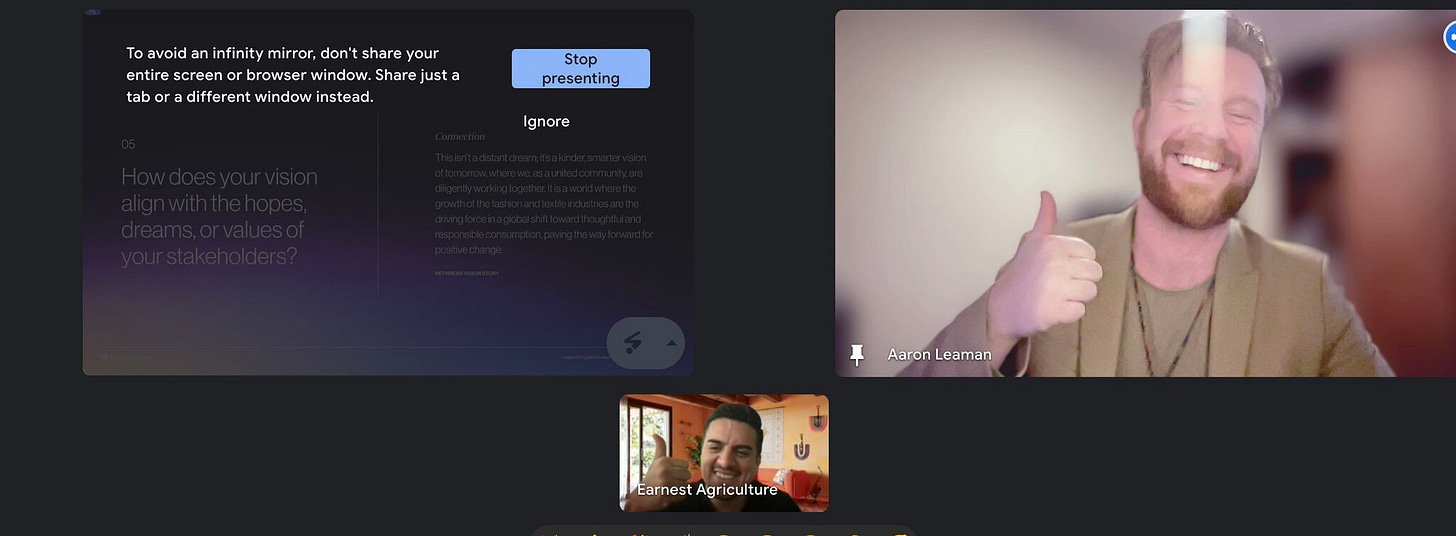Leading by Example: Why Founder Wellbeing Shapes Organisational Success
The Trickle Down Effects of Burnout, Investment Advice for Creating Systemic Change, and April Events
Welcome back to Changemakers, the official newsletter of Brighter Future.
We’re thrilled to have you here as part of the Brighter Future community, where together, we inspire progress and create opportunities for a better tomorrow.
This week, we’re exploring investor insights on building organisations that drive systemic impacts, alongside discussing the ways burnout and overworking can shape workplace culture. Plus, we’re highlighting a few key events taking place in April.
We’d love to hear your feedback on the content of these newsletters. If you have any thoughts or suggestions, send a message to mission@brighterfuture.studio.
Check out this week’s topics…
Investor Insights: Changing the Industry with Helmer Schukken of Rubio Impact Ventures
Healthy Leaders Who Prioritise Their Wellbeing Are The Ones With The Most Impact
April Events: Storytelling Workshops and Design Drop-In Hours
Investor Insights: Changing the Industry with Helmer Schukken of Rubio Impact Ventures

In our recent conversation with Helmer Schukken, Managing Partner at Rubio Impact Ventures, he provided some valuable insights into investment strategies and offered advice for startups seeking funding in the impact sector.
A few highlights from our interview with Schukken include:
Aligning with Systemic Impact Goals - Schukken emphasised that their firm seeks startups capable of driving systemic and lasting change within their industries. He emphasized, "Ultimately, when we look at impact, we try to achieve what we call systemic impact, which means if this technology is adopted and becomes mature, it will become the industry standard."
Why Fundraising Is Key for Startups - “If you're cash flow negative, fundraising is core business,” says Schukken. “The best entrepreneurs lock in 30 minutes of their time every week just to make phone calls to existing relationships they have with investors or new ones so that they're on the radar. By the time that you're fundraising, the whole process goes much faster.”
On Demonstrating Market Viability and Scalability - Schukken shared that investors prioritize solutions with clear market demand and scalability. For example, Rubio’s portfolio includes companies like Sama, a data annotation company which employs thousands in low-income communities of Kenya and Uganda, helping lift many out of poverty.
On Looking Ahead to the Future - There are a few industries that are lacking investment, including the industries around industrial heat, biodiversity solutions, and circular plastics. Schukken is optimistic about these industries and their role in climate action, saying, "If you deliver a sustainable solution that’s cheaper than fossil alternatives, you don’t need regulation— it will win on its own."
For a deeper dive into Helmer Schukken's insights and Rubio Impact Ventures' approach to investing, you can read the full interview here.
Healthy Leaders Who Prioritise Their Wellbeing Are the Ones With the Most Impact

Written by Keegan Sentner, BF Lead Storyteller
A few years ago, I had a conversation with a climate founder who had spent several decades pushing the boundaries of innovation. His organisation was growing, their impact was measurable, and on paper, everything looked like success. The problem was he was exhausted. Somewhere between endless meetings, late-night emails, and the pressure to deliver, he’d lost the passion that had once driven him.
That conversation stuck with me. As someone who has worked in climate and conservation for the better part of a decade, this wasn’t the first time I’d heard something like this, and in these industries, it surely won’t be the last.
The Process Begins By Recognising Your Needs
Over the years, I’ve had the opportunity to work alongside many remarkable founders, startups, and industry leaders, all driven by a shared vision of positive change. Across those interactions, I’ve started to notice a pattern: the most effective leaders don’t just invest in their organisations; they invest in themselves.
In an industry fuelled by impact and purpose, it’s easy to overlook personal well-being. There’s a common belief in the climate and impact sector that doing more means achieving more. That if we just push harder, we’ll reach our goals faster.
The reality? Overworking narrows vision, stifles creativity, and drains the passion that sparked the journey in the first place. The leaders who create lasting impact understand this and realise that looking after themselves isn’t a luxury; it’s a strategy.
I’ve spoken with many founders, including our exhausted founder, who have come to this realisation the hard way. They’ve hit a wall before recognising that their best leadership comes not from working themselves to exhaustion but from maintaining clarity, resilience, and long-term thinking.
For our exhausted founder, recognition was a turning point. He caught his burnout and made small but significant changes, blocking time for rest, setting clearer boundaries, and rediscovering the experiences in nature that first inspired his work.
In talking with him and others, I even started to recongise these same feelings in myself. The more stressed I am, the less time I spend outside, the more I get stuck in front of a screen, and the further I feel from the impact I want to make in the world.
I realised that I need to carve out time every week to be outside and away from work. Whether it’s running a local trail, walking through a park, or simply sitting by the river, these moments aren’t just a personal reset; they’re part of the process. They remind me of the places I work to protect and reinforce my ability to protect them.
Understanding the Role of Wellbeing in Company Growth
The problem with burnout is it isn’t just an individual challenge; it’s a systemic one. When leaders struggle with burnout, it doesn’t stay contained; it ripples through the entire organisation.
Companies like Patagonia realised this relationship between impact and wellbeing early on in their existence. Their “Let My People Go Surfing” ethos encourages employees to step away from their desks to reconnect with nature, reinforcing the idea that passion and purpose are fuelled by experience, not just ambition.
Yvon Chouinard, and other founders who prioritise wellbeing, realised that the moments they take to step away from work aren’t distractions; they’re investments in long-term impact and growth. When we take care of ourselves, we show up with sharper minds, deeper creativity, and the ability to lead with compassion and collaboration rather than reaction.
For our founder I spoke with, those small shifts toward wellbeing reignited his passion. That renewed energy spread throughout his team, helping foster a more balanced and engaged workplace culture.
His story and those of leaders such as Yvon Chounaird are a reminder that workplace culture starts at the top. When leaders model healthy boundaries, prioritise rest, and make well-being part of their strategy, their teams feel empowered to do the same. The lasting impact of this type of leadership then becomes clear, the organisations that embrace a healthier work mindset don’t just retain top talent; they attract individuals who are deeply committed to their projects and able to do their best work.
This mean, as leaders, we must set realistic expectations, encourage time away from screens, and openly discuss the challenges of balancing impact with personal well-being. Because the way we work shapes the culture we create.
When you take care of yourself, you’re not just improving your own resilience; you’re strengthening your entire team’s ability to create meaningful and lasting change for our planet.
At Brighter Future, we’re always learning, evolving, and striving to find new ways to be better leaders and collaborators. We’d love to hear how you and your organisation prioritise well-being. What strategies have worked for you? Share your thoughts, and we may highlight them in our next newsletter.
April Events: Storytelling Workshops and Design Drop-In Hours
Storytelling Workshops
Join us for a series of 3 interactive online sessions designed for climate and impact startups who are looking to develop compelling organisational stories.
Facilitated by Aaron Leaman, these storytelling workshops will focus on essential elements that will help you connect with investors, build loyalty with your audience, and attract top-tier talent.
The first workshop will be held on April 9th from 6:00pm to 7:30pm GMT, and will focus on your origin story. Two more sessions will be held later in the month for the Purpose (April 16th) and Vision (April 22nd) stories.
Design Drop In Hours
Just a reminder, that we have some Design Drop-In Office Hours tomorrow April 4th from 10:00 to 11:00 AM GMT, to help climate and impact startups bring their design challenges for feedback from Brighter Future’s creative team.
If you’re unsure if your visuals align with your story or need help creating a stronger visual impact, we want to help. Our design experts will provide feedback on everything from logos to website layouts, ensuring your brand visuals are effectively communicating your message.
Drop by at any time during the hour window for an informal chat and actionable feedback with our team. Let us know your coming with the link below.
Thanks for joining us this week. Take care of yourselves and we will be back with another edition of Changemakers soon. See you then.
Sincerely,
The Brighter Future Team
Check Out Our Services
Stories That Reshape Tomorrow, Designs That Deliver Impact.
From branding to web development, we craft solutions that amplify your mission, engage audiences, and achieve results.
📧 Our latest services can be found in the link below or by contacting mission@brighterfuture.studio.





